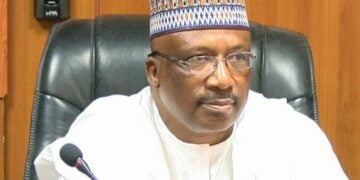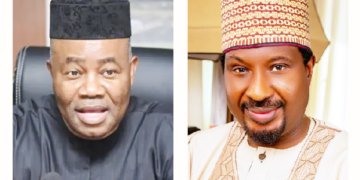The federal government is currently drafting an executive bill that will be known as the National Tax Policy Document, this newspaper can exclusively report. The move is part of steps toward enhancing fiscal discipline and aligning Nigeria’s revenue generation with its borrowing framework.
Spearheaded by the Presidential Fiscal Policy and Tax Reforms Committee, chaired by renowned tax expert Taiwo Oyedele, the draft proposal seeks to institutionalize a strategic tax framework that would guide government revenue expectations, expenditure planning, and the fiscal deficit threshold—ultimately helping authorities determine appropriate borrowing levels.
The initiative, which is being coordinated from the executive arm of government, is expected to soon be transmitted to the Federal Executive Council (FEC) for review and possible adjustments, before it is forwarded to the National Assembly for consideration and legislative action.
Presidency sources familiar with the development told this newspaper that the move is aimed at entrenching transparency, fiscal prudence, and long-term sustainability in the management of government revenues and expenditures.
“The proposed document will serve as a fiscal compass. It will not only help project what the government should expect as revenue but also inform how resources should be allocated to avoid waste and duplication,” the source said on condition of anonymity.
At the heart of the new proposal is the need to eliminate fiscal inefficiencies across Ministries, Departments and Agencies (MDAs) by ensuring that expenditures are aligned strictly with revenue projections.
That is expected to enable a more accurate assessment of the nation’s fiscal deficit, a critical metric in public finance that guides how much the government needs to borrow to meet its obligations.
With Nigeria’s public debt stock rising to over N121 trillion as of March 2025, and debt service consuming a large chunk of government revenue, experts say the move to align tax policy with borrowing decisions is long overdue.
If passed into law, the National Tax Policy Document will institutionalise a revenue-expenditure framework that enforces discipline in the fiscal system—ensuring that the government only borrows what is necessary and justifiable.
The bill is coming just weeks after President Bola Tinubu signed four landmark tax laws, further demonstrating the administration’s strong push for a reformed and robust tax system. The new laws aim to simplify the tax structure, close compliance gaps, and expand the tax net without imposing additional burdens on already compliant taxpayers.
The administration has consistently emphasised its commitment to increasing Nigeria’s tax-to-GDP ratio from the current 10.8 per cent to at least 18 per cent, in line with the average across African economies. Oyedele’s committee is central to achieving this objective.
According to earlier statements by Oyedele, the committee’s mandate includes “harmonising multiple taxes, eliminating nuisance taxes, and creating a predictable fiscal environment that attracts investment while ensuring fairness.”
For years, Nigeria has struggled with inadequate revenue mobilisation, even as public spending continues to rise, largely funded through borrowing. The result has been rising debt stock, high debt-service-to-revenue ratios, and fiscal unsustainability.
Observers have long blamed the situation on the absence of a cohesive national tax policy that connects revenue mobilisation directly with expenditure and borrowing plans. While various tax reforms have been implemented in isolation over the years, this new proposal represents the first time the federal government is consolidating these efforts into a binding fiscal policy framework.
The proposed National Tax Policy Document seeks to reverse this trend by laying down an integrated strategy that links revenue collection, expenditure control, and borrowing—creating a transparent and sustainable fiscal environment.
Once the draft is finalised by the Oyedele-led committee, it will be presented to the Federal Executive Council for vetting. If adopted, the executive will then forward it to the National Assembly in the form of an executive bill for legislative consideration.
Lawmakers are expected to subject the draft to public hearings, stakeholder engagement, and legal scrutiny before passing it into law. If successful, it will become a cornerstone document, codifying Nigeria’s tax and fiscal philosophy for years to come.
A fiscal law expert who preferred anonymity because the proposal was still at draft stage lauded the move, describing it as a “game-changer” that could overhaul Nigeria’s public finance management system.
“This is the kind of forward-thinking approach we need to ensure that the government lives within its means. Aligning revenue expectations with expenditure and borrowing limits is the only sustainable path forward,” the Professor of tax law stated.
The experts believe that the initiative will boost investor confidence. Their agreement is premises on the fact that investors want predictability. The agreed that ‘when the government has a clear and transparent fiscal roadmap, it enhances confidence and helps in economic planning for both the public and private sectors.’
If the process scale through executive node and legislative fine tuning, the National Tax Policy Document will provide a framework for: projecting realistic revenue targets; designing rational expenditure programs; determining sustainable fiscal deficits; ensuring targeted and justified government borrowing; eliminating duplication and waste in public spending; and institutionalizing transparency and accountability in resource application.
A member of the draft committee told our Correspondent that it will also serve as a benchmark for assessing fiscal responsibility across tiers of government and guide the annual budget process going forward.
As the nation awaits formal presentation of the draft to the Federal Executive Council, all eyes will be on how the policy will shape the future of Nigeria’s public finance—potentially signaling the beginning of a new era in fiscal governance.





